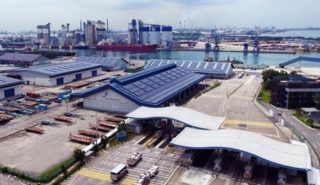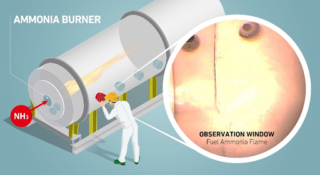-
60MWe ammonia power plant and marine fuel bunkering terminal planned for Jurong Port, Singapore
Date posted:
-
-
-
Post Author
Greg Kelsall
-

Jurong Port, Mitsubishi Heavy Industries Asia Pacific (MHI-AP), a subsidiary of Mitsubishi Heavy Industries, and JERA Asia, a subsidiary of JERA, have signed an MoU to explore establishing a 100% ammonia direct combustion power plant on Jurong Island, Singapore, home to the country’s chemical and energy industries. Under the MoU, a joint study will be carried out for a 60MW gas turbine combined cycle plant fired by ammonia. It is planned to produce carbon-neutral electricity, as well as stimulate ammonia demand to be ready for ammonia bunkering in the future. The MoU builds on an initial agreement between Jurong Port and MHI-AP signed in August 2021 for a pre-feasibility study on ammonia direct combustion technology for green power generation, as reported previously by IFRF.
The three companies will contribute to achieving net-zero CO2 emissions in Singapore by leveraging their technology, resources and expertise. Jurong Port is a multipurpose port operator serving as Singapore’s premier gateway for general and bulk cargo, including overseas ports in China and Indonesia. MHI-AP delivers integrated solutions to the region in urban development and infrastructure, energy and utilities. As reported in a previous IFRF blog, MHI is already working on the technology to burn ammonia in thermal power plant boilers and hydrogen fired gas turbines at its Takasago Hydrogen Park to validate hydrogen value chains. JERA is an equal joint venture of two major Japanese electric companies, TEPCO Fuel & Power Incorporated and Chubu Electric Power Company, with the mission to offer energy supply models established in Japan through JERA’s global operations to other countries.

Earlier this year, the Singapore government raised its climate ambition to achieve net-zero CO2 emissions by or around 2050. This project is aligned with the overall national decarbonisation goals as it aims to utilise ammonia, which can efficiently transport and store hydrogen in a liquid state at low cost, as a fuel to generate carbon-free electricity and as the main bunkering fuel in the future to decarbonise the maritime sector.
“We feel this MoU could help pave the way for encouraging the adoption of hydrogen in Singapore through aggregation of demand across multiple sectors, mainly the power sector and the maritime sector, thereby addressing the chicken-and-egg conundrum of infrastructure versus demand needs for maritime and domestic power generation. This collaboration is certainly consistent with the spirit of reinforcing Singapore’s premier bunkering hub status – for current, transition and future fuels.” said Ooi Boon Hoe, Chief Executive Officer, Jurong Port.
Osamu Ono, Managing Director, MHI-AP, said: “Ammonia, which consists of hydrogen and nitrogen, is a highly efficient hydrogen carrier and can be directly combusted as a carbon neutral fuel, thereby contributing to the establishment of a robust hydrogen value chain. At MHI, we believe that ammonia and hydrogen are key fuels that can help countries meet their net zero goals, and this MoU is an exciting opportunity for us to contribute our technology and expertise to achieve sustainable development in Singapore and subsequently realise the global sustainability agenda.”
“JERA is committed to providing cutting edge solutions to the world’s energy issues and is actively working to strengthen both the ammonia and hydrogen value chains. We believe this MoU offers a unique opportunity to support Singapore’s decarbonisation efforts while advancing the ammonia technology development for carbon neutral power generation. Through initiatives like this, JERA will leverage its experience and capabilities to help countries to reach their net-zero CO2 emissions targets and to build a clean energy supply chain in the region,” said Toshiro Kudama, Chief Executive Officer, JERA Asia.
